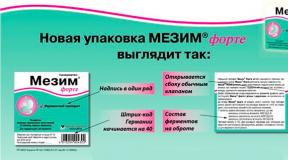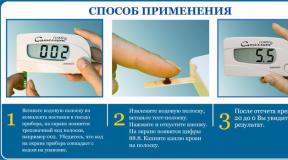Laser vision correction by quota. How to make laser vision correction for free under the MHI policy? Do I need to pay extra for services?
08.10.18 73 371 75
And returned part of the money in the deduction account
I have severe myopia, elementary school I wore glasses.
Natalya Zhutova
did laser correction vision
I tried a lot: I went to tricky procedures, did exercises for the eyes, dripped drops, changed glasses for lenses. Nothing helped, and the lenses only got in the way. By the age of twenty, I could barely see the top lines at the optometrist.
When I finally got tired of all this, I decided on laser vision correction. On the recommendations of friends, she turned to a well-known state clinic - and for four years now I can see perfectly without glasses.
What will you learn
How is myopia treated and how is it not treated?
Modern medicine is not yet able to restore vision without surgery. Nearsightedness, farsightedness and astigmatism are various states optical parameters of the eye, in which the ratio of anatomical structures is violated: the eye is too long, short, or it has curved optics. Because of this, a person sees worse.
Natalia Maychuk
ophthalmic surgeon
During a vision correction operation, the surgeon changes the shape of the cornea with a laser according to a pre-calculated program - and brings the optics of the patient's eye to the ideal. Anatomical changes in the eye persist for life, but a person begins to see as if they were not there, and sometimes even better than healthy people.
The operation does not help everyone equally well, because the result depends on the initial state of the eye. And there are contraindications when the operation will not work. But another way to save a person from glasses or lenses has not yet been invented.
Myopia cannot be cured by training and drops. On the Internet and in the media there are stories about the "cure" of myopia, but usually it's about something else. Young people have a so-called spasm of accommodation - this is when the muscles inside the eye tense too much and "forget how" to relax. Muscle spasm causes "false myopia": it is shown by devices and the person really sees worse, but for some time the ratio of anatomical structures in the eye remains normal. If the doctor diagnosed "habitual excessive stress of accommodation" - this is just the case. Most often this happens with those who spend too long on the phone or at the computer.
Muscles can be relaxed with workouts or drops - and vision improves. But this only affects that part of the diopters that arose due to muscle spasm. If changes have already begun in the eye and myopia has developed, they will not help. Therefore, it is wrong to call it a treatment for myopia.
Preparing for the operation
As the doctor explained to me, laser vision correction is not for everyone. For example, myopia should not progress too quickly: no more than 0.5 diopters in six months, and preferably in a year. In addition, the length of the eye should remain the same, whatever that means.
The progress of myopia is assessed according to the medical history, the rest is checked before the operation at the initial examination.
In my clinic, it was possible to undergo an examination under compulsory medical insurance, or you could pay for it. But according to the MHI, everything was booked for two weeks in advance, so I decided to pay. In addition, it turned out that the compulsory medical insurance policy does not cover everything: for example, images of the anterior and posterior surface of the cornea are still made for money. For a paid examination, I laid out 5300 R. According to OMS, it would cost 1300 R.

The survey took up most of the day. Doctors checked the sharpness and field of my vision, intraocular pressure, the shape of the cornea, probably something else. I was asked to look at a point, read the letters, be patient while they put drops in my eyes. The doctor also asked if I wear contact lenses. It turned out that before the operation, the eyes need to rest from them. And if you wear lenses for many years, then the cornea becomes thinner and laser correction can no longer be done.
I did not find any contraindications for laser correction. We discussed the options for operations with the doctor and chose Femtolasiq - this is something in between in terms of complexity and price. The operation was scheduled for the next day.

I left the clinic half-blind: everything was in a fog from the drops, and in order to see the bus number, I had to come close to it. I regretted not asking anyone to pick me up.
Before the operation, I also took three days off from work and agreed that I would be without a computer for a week afterwards. Meetings, discussions yes, emails no. As it turned out later, this was a mistake: I only got under my colleagues' feet. Now I would take this week at my own expense.
Contact lenses and laser correction
Before laser vision correction, we always ask if the patient uses contact lenses and if so, for how long. The operation is performed on the cornea, and the lenses do not have a very good effect on it: they reduce the access of oxygen, “rub”, violate metabolic processes and cellular composition. The sensitivity of the cornea decreases, a tear is produced worse. All this makes it difficult to transfer the operation well and recover quickly.
Natalia Maychuk
ophthalmic surgeon
In addition, recently removed lenses can distort examination data. If the doctor does not know about them, there is a risk that the correction will be less accurate.
Operation day
The operation itself lasted about ten minutes, but I spent almost the whole day in the hospital: from 10 am to 4 pm. They checked my eyesight again, told me what would happen and how, dressed me in a dressing gown and escorted me to the operating room. There, local anesthesia was dropped into my eyes, and they stopped feeling anything, although I could blink.
When the anesthesia worked, I was taken to the operating room, laid on a table and asked not to move. I was afraid that if I moved, the laser would hurt my eyes, but I was reassured: in this case, it would simply turn off. One eye was glued shut, and a spacer was placed on the other. After that, the apparatus was brought up, and it became dark: during the operation, only a pinpoint light was visible. I also felt a slight pressure on my eye - it was unpleasant, but not painful. Then everything was repeated with the second eye.

After the operation, I immediately began to see well, but at first everything was in a fog. Something was dropped into my eyes again, they asked me to sit down, and then my eyesight was checked. After that they were allowed to go home.
Visual acuity before and after surgery
Before surgery
Right eye
left eye
After operation
Right eye
left eye

After operation
On the advice of the doctor, I took sunglasses with me: without them, at first the light seems too bright. The eyes are comfortable in the dark, behind curtains and without a monitor. On the street, I could see well in the distance, but close up everything was still in the fog, so I couldn’t immediately enjoy the result.
The first day after the operation, I was offered to wait in the dark and at rest in the ward for 4750 R. But I turned out to be more prudent than the day before: I was taken from the clinic and taken home. At home, I realized that I rejoiced early: I was not prepared for leisure in the dark and without a computer, so it was very boring.
The doctor advised me to stay away from the phone and computer at first. For a week and a half, the eyes are adjusted to work close, so it’s better not to look at the screens at all. Two weeks you can not paint, go to the pool and generally play sports. It is better not to touch your eyes either - even if it seems that grains of sand have got into them. The first time it should be.
I came to the clinic for two more scheduled examinations: one day and one month after the operation. The first time I was prescribed two types of drops, the second time they checked what came of it. These visits were included in the cost of the operation.
During the year I was asked to come back several times. The first year after the operation, an examination with a consultation cost 1300 R. From the second year, the price rose to 2300 R. It is believed that by this time the eyes have recovered and mandatory examinations are not needed. Therefore, later I had my vision checked at the district clinic, free of charge.

Before the operation, my friends doubted that the vision would last for a long time. So, friends: it depends only on me. After the operation, the surgeon gathered all the patients together and explained: the laser corrected visual impairment, but this does not mean that now we will always see well. At a minimum, you need to get rid of the myopic habit of sticking your nose into the phone, accustom yourself to take breaks from work and master exercises for the eyes. Without this, myopia will increase, and the correction will no longer be enough to compensate for it. Vision will deteriorate again.
Myopia after surgery
Nearsighted people have weakened muscles that are responsible for near vision. This is especially true for those who used glasses with insufficiently strong lenses before the operation or did without them at all. Therefore, the muscles after the operation should be spared and the load should be increased gradually. I ask patients to do nothing at close range for a week, and then switch to a sparing regimen - the only correct one from the point of view of hygiene.
Natalia Maychuk
ophthalmic surgeon
The total load near should be no more than 6 hours a day. After 40 minutes of work, it is worth taking at least a five-minute break with switching your vision to distant objects. If at work you have to constantly look at something close, in the evening your eyes should rest from this.
How much did I spend
Vision correction operations are aesthetic surgery: they are performed at the request of a person, and not for medical reasons. Therefore, they are not covered by compulsory medical insurance, and in 2015 my operation cost 89,800 R, I spent another 10 thousand on examinations and medicines.


Briefly: how to do laser vision correction
- Check with your doctor. Laser vision correction is an aesthetic operation: you decide whether to do it or not. But it's still an operation, so always listen to what the doctor says.
- Agree that you will not be anywhere for three days. The first day will be spent on examinations, the second - on the operation, the third you will sit in the dark. Then another week will not work to use the computer.
- Sign up for an initial inspection. In a state clinic, this can be done according to compulsory medical insurance, but you still have to pay for some studies.
- On the day of surgery, do what the doctor says.
- After surgery, do what the doctor says.
- For the operation to help for a long time, do what the doctor says.
- Laser vision correction is not done under compulsory medical insurance or a quota, but part of the money can be returned using tax deduction. When you pay, ask to prepare documents for him.
Frequently Asked Questions FAQ
Our service is in demand in Russia and the CIS countries and is regulated by Russian law
Program " Eye surgeries accessible to everyone!”
This program developed by Our Partner LLC (TIN 2129071033)
Subdivision - Hotline "Eye Microsurgery" in Russia.
Program goal: Make available eye surgeries.
Program objectives:
1. Increase the efficiency of medical institutions in Russia.
2. Reduce the import of contact lenses to Russia.
3. Improve the quality of life of Russian residents.
Why such a price?
Laser vision correction 13,500 rubles for both eyes - affordable price in the world.
This price is achieved by:
1. More effective use laser equipment- in most clinics in Russia, up to 50 operations are performed per month. The operation lasts up to 20 minutes. It turns out that equipment costing several tens of millions of rubles works several hours a month. It's like buying a KAMAZ for a construction site, and it will work 20 minutes a day. With more patients, the efficiency of the equipment increases.
2. Coordinating and offering to work with clinics - partners in our program "Eye surgeries available to everyone" for 13,500 rubles for both eyes - operations become REALLY affordable due to the price.
3. We constantly learn and use various, most effective marketing tools to inform you about our offer.
4. Due to the volume it is possible reduce the cost of consumables for 1 person.
Consequently - clinic efficiency is increased by increasing the volume of transactions. Every day we work on our own efficiency at all stages of work with clients. All clinics with which we cooperate are subject, among other things, to our verification. Each of the surgeons is highly professional and has extensive experience. We understand the value of the health of EACH of our patients and accompany him at all stages of the operation and after. For us, the reference point is Pobeda Airlines. Observing quality, make eye surgeries affordable.
Why is the Eye Microsurgery Hotline needed?
We are engaged in directing large flows of patients to clinics, marketing, promotion, and organizing services for our clients.
The clinic is engaged in production, that is, diagnostics and operations, and is not distracted by attracting customers, promoting its services.
The patient receives complete and reliable information about laser vision correction about the clinic, without distracting the staff of the medical institution. He is expected at the clinic, and they are always happy to answer any questions in the Hotline.
Tell me, honestly, please, is this really the final amount and you won’t have to pay a penny more?
All your expenses will be:
Diagnostics 3 500 rubles
Laser vision correction for both eyes 13 500 rub
Total for medical services: 17,000 r (you pay this amount at the clinic. Payment only by credit card!
)
If you are offered to pay an amount more than indicated, call the Eye Microsurgery Hotline at 88001009876.
If you have someone to live with (friends, acquaintances, relatives) you can live with them. If there is nowhere to live, we can offer accommodation in a hotel or hostel located near the clinic.
Accommodation in a hostel located in the clinic building 650 - 2500 r / day.
After the operation, the doctor prescribes drops that you will instill for 1-2 months. The cost of drops after surgery is 500-1000 rubles.
I am from another region. How and where can I be operated on under the program?
The program operates on the territory of the Russian Federation.
Clinics where you can make laser correction under the program "Eye surgeries available to everyone!":
Moscow. Clinic "Vision 2100".
Kazan. Clinic "Reliable hands".
Ulyanovsk. Clinic "New Look".
Patients from other regions can be operated on in these clinics. (Patients with a residence permit in Tatarstan are not operated on at the Reliable Hands clinic).
How many days will the whole event take?
If you are prescribed Lasik, you can return home after 3 days. If Magic, then in 5 days.
If you have been prescribed Lasik:
First day. Diagnostics
Second day. Laser vision correction (Lasik) for both eyes.
The third day. Postoperative examination, receipt of documents. Departure home.
If you have been prescribed Magic:
First day. Diagnostics
Second day. Laser vision correction (Magic) for both eyes.
The third day. postoperative examination,
Fourth day. postoperative examination,
The fifth day. Postoperative examination, receipt of documents. Departure home.
Why does Magic take longer?
With Magic, the area of restoration of the corneal epithelium is larger, it heals in 1-3 days.
How everything happens in stages
2. Entry confirmation
3. Receiving the necessary documents by e-mail
4. Testing
5. Arrival at the clinic
6. Diagnostics
7. Check-in at the hotel
8. Operation
9. Postoperative examination
10. Obtaining the necessary documents at the clinic
11. Departure home
Enrollment Confirmation
When your application is processed, you will receive a letter to the specified e-mail with a list of analyzes required for the operation, as well as all other documents.
Testing
You have received a list of tests from us.
Your actions:
Print out the list of analyzes, contact this document:
1. To a therapist at the place of residence and take these tests according to compulsory medical insurance policy(the result is usually ready in 3-7 days)
2. To any private clinic/laboratory and take tests for money (the result is usually ready in 1-3 days)
Put the finished results of the analyzes into a file and present them at the clinic before the operation.
If you plan to have laser vision correction in Moscow at the Vision 2100 clinic, then you can take all the tests after the diagnosis. The cost of analyzes is 1,500 rubles. The result will be ready in 1-3 hours
Diagnostics (takes 2-3 hours)
What to bring for diagnosis:
Sunglasses;
Paper napkins.
Come into the clinic.
Contact the administrator, say that you are for diagnostics and subsequent surgery from the Eye Microsurgery Hotline
Draw up contracts for the provision of medical services
To draw up a contract, you will need an identity document: Passport or military ID for citizens of the Russian Federation, foreign. passport for foreign citizens.
You pay for diagnostics in the amount of 2,500 rubles.
You can pay only from a bank card .
Loans, installments and other banking services are not provided in the clinic.
First, the refraction is checked (what is your minus / plus) on the device.
Examination intraocular pressure(to rule out glaucoma)
Checking the thickness of the cornea (evaluation of the parameters of the cornea to clarify the possibility of laser vision correction, excluding keratoconus)
Biomicroscopy. The doctor examines the eyes under a special microscope (slit lamp) other eye diseases, incl. cataract.
Examination of the fundus. The doctor examines the fundus to rule out retinal pathology.
Drops are instilled to dilate the pupil and relax the internal eye muscles.
Again, refraction and vision are checked against the background of relaxed eye muscles. To clarify the degree of myopia/farsightedness.
Basically everything.
At the last stage, the doctor tells you about the possibility / not the possibility of laser vision correction. Here you can discuss with him the prognosis of the operation, how to behave during the operation, ask your future surgeon any questions you have left.
Possible results of a diagnostic examination
1. Approved for the operation(You are told the type of Lasik/EpiLasik/PRK/Magek operation). Presumably the next day, laser vision correction is possible.
2. To laser vision correction approved, but required Retinal strengthening(Laser coagulation of the retina/LKS). In this case, the LKS is made the first step (you pay separately, NOT included in the price of 13,500). And after LKS, vision correction is possible in 1-60 days, depending on the state of the retina, the doctor will inform you about this.
3. To laser vision correction not allowed You will be given a conclusion with a description of the diagnosis and recommendations. In this case, you can contact the “Eye Microsurgery” hotline in the Russian Federation 88001009876, we will consider other, alternative solutions to your issue.
4. If the diagnostic examination revealed Cataract or lens replacement required, this type of operation in most cases can be carried out under the policy CHI - Free, You can contact the Hotline "Eye Microsurgery" in the Russian Federation 88001009876, we will advise you and refer you to another medical Center to carry out the operation.
Strengthening of the retina is required (Laser coagulation of the retina)
If you have been told that you have dystrophic areas on your retina and you need to strengthen the retina, then this must be done so that there is no threat of retinal detachment.
After strengthening the retina, laser vision correction can be performed every other day, 3, 7, a month, three, depending on the degree of changes in the retina. You need to ask the Doctor about this, who will strengthen the retina.
If you have been told that you have suspected keratoconus
It's good that they got tested. It is better to know and be prepared than not to know and get complication.
According to our data, suspicion of keratoconus occurs in 5-10% of patients who decide to undergo an examination for laser vision correction. And almost 90% of them used contact lenses for more than a year.
Your actions:
You will need to take a conclusion from the doctor who performed the diagnosis.
In this conclusion, all measurements of the parameters of the eyes that were carried out must be indicated.
Also, be sure to get a printout of the keratotopograph, with your data.
Report the refusal of the operation to the “Eye Microsurgery” hotline. You will be booked in for a follow-up appointment.
Further. If you suspect keratoconus, you will need to undergo a second examination, preferably in the same clinic after 6 months to confirm / refute the diagnosis. If the diagnosis is not confirmed, then it will be possible to do laser vision correction.
If the diagnosis is confirmed, report it to the Eye Microsurgery Hotline, you will be offered a medical institution that specializes in the treatment of keratoconus.
Questions about diagnostics
After the diagnosis, you may have discomfort in the eyes.
During the diagnostics, drops are instilled in you to examine the fundus of the eye.
Discomfort after diagnosis is associated with dilated pupils.
Behind the wheel
It is not recommended to drive a rhinestone after the diagnosis (about three hours after the diagnosis, you will have dilated pupils, against this background, there is photophobia, discomfort, driving is not safe). Wait until the action of the drops ends and the pupils narrow.
Is an escort required for diagnostics or surgery?
As a rule, after the diagnosis and operation of laser vision correction, an attendant is not required. If the patient cannot move independently in normal life (a problem with the musculoskeletal system - a wheelchair, crutches), then an accompanying person will be required.
Tickets and road
If you live in another city, you can get to the clinic by train, plane, intercity bus or car (but not driving).
It is better not to buy return tickets.
Getting there using services such as Bla-Bla Car is not recommended, since it is not known who and in what condition will be driving. This is a matter of your safety.
Arrival at the clinic.
It is better to get to the clinic from any station by metro or taxi. We recommend using Yandex Taxi / Gett Taxi / Uber. Since the cost of the trip will be clear.
Download any of these apps while at home. Check out how it works.
In another city, calling a taxi may require internet access.
play.google.com (for Android)
App Store (for Apple)
Gett Taxi: https://itunes.apple.com/us/app/gett-nyc-black-car/id449655162?mt=8
Moscow city - Clinic "Vision 2100" (street Akademika Anokhin, 13)
To the metro station "Yugo-Zapadnaya" (red line). 15 minutes walk.
How can I live in another city?
If you live in another city, then during the operation you can stay with friends, acquaintances, relatives or in a hotel / hostel located near the clinic.
Hotel accommodation. The choice of hotels in the area is great, for any budget.
Accommodation in the hostel "HostelsRus" (address: Moscow, Anokhin st., 13)
Code phrase for discounted check-in: "From the Eye Microsurgery Hotline".
Booking phone: 89259066294 time for booking 06:00-24:00 Moscow time.
Accommodation in:
6-8-bed rooms Cost - 650 rubles / day / bed (separate accommodation for men and women)
4-bed room Cost - 750 rubles / day / bed (separate accommodation for men and women)
2-bed room two separate beds Cost - 1000 rubles / day / bed (with the possibility of sharing any gender)
Family room large double bed Cost - 2500 rubles / day / room (can accommodate 2 adults + 2 children if necessary)
Living conditions: Toilet / shower, The kitchen has a microwave, refrigerator, stove, Bed linen and towels, WI-FI unlimited, Closed wardrobe area, with personal boxes for shoes and hangers for outerwear, Tea, coffee, light breakfast (cereal milk ), Video surveillance of lockers, Coworking area in the corridor, availability of places to relax in common areas, Disposable slippers are provided, but it is better to take your own.
Book your hotel room TODAY
Compulsory medical insurance is a component of the system of insurance services provided at the state level. It is needed to ensure equal opportunities in terms of the provision of qualified medical care patients of different social categories. The OMS policy includes wide range services, including expensive surgeries. About what areas of intervention are included in compulsory insurance, how to get them for free, and when a refusal is usually given and the operation is not performed, further.
What is a CHI policy - definition
CHI is compulsory health insurance, the most important component. Thanks to this policy, all citizens of the Russian Federation receive equal access to medicinal and medical care (this becomes possible by attracting). The procedure for providing and the list of services is specified in No. 326-FZ of November 29. 2010 "On compulsory health insurance in the Russian Federation."
Free assistance is provided throughout the country in the amount prescribed in the basic program, and at the place of residence - in the amounts specified in the territorial rules.
The basic program is developed and approved by the Government of the Russian Federation, while the territorial program is developed by the official representations of subjects (regions). medical assistance within the framework of the policy, those organizations that are part of the register of the Territorial Compulsory Medical Insurance Fund provide.
Read what is included in the free maintenance of the policy.
What does the basic package include
The program of state guarantees clearly spells out the list of preferential services that should be provided free of charge to citizens of the Russian Federation. They are paid at the expense of the budgets of different levels (city, regional, federal) and from the compulsory medical insurance fund.
Treatment and under what conditions it is provided
Under the policy, you have the right to undergo treatment in the following areas:
Read where you can get a medical policy.
In accordance with the provisions of the current state program, citizens of the Russian Federation can receive treatment for most diseases free of charge.
List of preferential ambulance and polyclinic services
Ambulance and polyclinic services outpatient care are included in . This also includes carrying out diagnostic, therapeutic measures in a day hospital, in a clinic or at home.
Drug provision during treatment in the outpatient department is not included in the CHI program.
What services are included in the program under the state insurance system
Within the framework of the state insurance system, inpatient care is provided free of charge for:
- Childbirth, abortion, pathologies of pregnancy.
- Injuries requiring intensive care, poisoning, exacerbations chronic diseases, the need for treatment of pathologies in acute form, isolation according to epidemiological indications.
- Planned hospitalizations as part of therapy and rehabilitation programs, including when constant medical supervision is needed.
The list of additional paid inpatient services is specified in the order of the Health Committee.
On a paid basis (voluntary or) during your stay in a medical institution, the following services can be provided:
- stay in the ward advanced level comfort, other individual service;
- examination, treatment for concomitant diseases in the absence of exacerbations;
- observation, examination, treatment at home (except when the patient does not have the physical ability to visit a medical facility on his own);
- anonymous services (except for free AIDS diagnostics);
- assistance to persons who are not entitled to receive gratuitous assistance within the framework of the territorial state program;
- medical care using alternative (but necessarily permitted at the state level) technologies, methods of treatment;
- consultation on the personal initiative of citizens.
Read also about how to arrange for a newborn.
They do not make preventive vaccinations for free at the request of citizens, do not carry out homeopathic treatment, dental prosthetics, some.
Cosmetological services, sexological therapy is carried out only for a fee.
What free operations are done under the policy and who pays for them - a list of the main areas in surgery
A number of surgical operations under the CHI policy are performed free of charge. The main areas in which they operate:
- Gynecology and obstetrics.
- Abdominal surgery.
- Treatment of severe burn injuries.
- Transplantation.
- Traumatology, orthopedics.
- And others – organ surgery chest, blood vessels, heart, rheumatology, ophthalmology, hematology, etc.
Read about MRI for free under the policy.
Thus, under the CHI policy, most of the surgical operations are performed free of charge. Rehabilitation activities are also in most cases provided free of charge (you will find a list of exceptions below).
If you are being forced to pay for an operation that should be free of charge, call the MHIF hotline.
How to issue a coupon for surgical intervention - sign up for a planned operation
Free transactions are carried out according to the coupon. To get it, in order to start the operation, you need to collect a complete package of documents:
- Extract from the protocol of the commission of doctors.
- An extract and a medical card with a rationale for the need for treatment.
- Passport, copy, application from a citizen who wants to use the service.
- CHI policy and a copy.
- Certificate of disability (for those who have it).
- with a copy (if any).
How to get a referral for hospitalization in a polyclinic and start surgery
A referral for planned or emergency hospitalization can be taken from the attending physician - he will also draw up the necessary documents. He is sent to the Ministry of Health or a specific medical institution within three days, if the commission approves the request, the patient will receive a coupon.
Can a patient choose a clinic? No, but he has the right to express his wishes - if possible, they will be taken into account.
Please note that the list of free operations is updated annually and depends on the region. At the moment, under the MHI policy, you can conduct and enroll for free:
- Endocrine surgery is surgical treatment parathyroid glands, adrenal glands, thyroid gland.
- Cardiovascular, cardiological operations - on peripheral arteries, including vertebral and carotid.
- Urological treatment - endoscopic interventions for adenoma prostate, urolithiasis, reconstruction of the pelvic floor organs with their prolapse, urinary incontinence.
- Neurosurgical interventions - on the spine.
- General surgical operations - laparoscopy for abdominal hernia, cholelithiasis, inguinal, umbilical hernioplasty, etc.
- Oncological treatment - combined methods are used.
- Assisted reproductive operations - in vitro fertilization.
- Gynecological interventions - plastic surgery during vagina prolapse, removal of fibroids or fibroids with preservation of the uterus, hysterectomy, laparoscopy, operations on the uterine appendages, plastic surgery of the genital organs of the third category.
- Coloproctology - removal of hemorrhoids, excision of the epithelial coccygeal passage, perianal tissue with a fistula.
- Otorhinolaryngological operations - septoplasty, polypotomy, tonsillectomy, endoscopic maxillary sinusotomy.
- Laser vision correction is not cosmetic surgery for the treatment of myopia, cataracts, astigmatism.
In these cases, the intervention for the owner of the CHI policy will be free, he pays for the medicines himself. If a Russian-made lens (for cataracts) offered to a patient under the insurance policy does not suit him, he has the right to order an imported one, but at his own expense.
In what cases can they refuse to operate
A free surgical operation, even if it is included in the list of mandatory services, may be denied. Main reasons:
- The patient can be cured without intervention.
- Indications for therapy with high-tech methods.
- The limit of benefits in the Ministry of Health for a year has been exhausted.
If you were denied due to the exhausted limit of benefits, find out which medical institutions have state-funded places. If there are none at all, issue a coupon and a quota.
Read about how to restore a policy in case of loss.
When there are no free places, and the operation is needed urgently, it is better to do it on a paid basis, and then apply for compensation.
You may also be denied free rehabilitation. It is issued for severe anemia, postoperative complications, patient disability, sexually transmitted diseases, hypertension, drug addiction, alcoholism, severe mental disorders, oncology.
If you think that you have been unlawfully denied rehabilitation at the expense of budgetary funds, call the MHIF - and a specialist will help clarify the situation.
Video
conclusions
Under the MHI policy, you can get a large list of medical services free of charge. Please note that some inpatient treatment services are paid additionally, and the operation may be denied if the limit of budgetary places is exhausted, or the patient can be cured without surgery. For any controversial issues, you can call the MHIF hotline.
Laser vision correction is a procedure that has ceased to be a curiosity for the population. Today it does not scare the townsfolk. The myths that have accompanied the procedure for a long time have been dispelled. The cost is not so high, and affordable for most. But, nevertheless, for many, a correction performed even on one eye can be a rather expensive procedure, which is why many are wondering about its implementation under the CHI policy.
In general, the compulsory health insurance policy expands its capabilities every year. If earlier it could come in handy, perhaps, only for going to the district clinic, today, according to compulsory health insurance, you can undergo examinations and procedures in some commercial clinics. Dentistry, IVF, just an appointment with a therapist in a paid clinic, and much more is available today under a compulsory health insurance policy. More information about all its capabilities can be found on the MedPravo.su portal.
So is it possible to carry out laser vision correction according to OMS?
And so, such an opportunity. You can carry out laser vision correction in any clinic that provides compulsory medical insurance services. It is not difficult to find out by simply calling the clinic itself and clarifying this point.
I would also like to note that if earlier such an operation was performed only by private medical institutions, today many public hospitals (though, as a rule, only central regional ones so far) also carry out this procedure.
Unfortunately, the insurance company is not ready to pay for such an operation to everyone. Only a certain class of patients (according to the quota) has the opportunity to carry out correction free of charge.
Every citizen who has a compulsory medical insurance policy can take advantage of such a benefit, but only if there are indications for this correction. The decision to allocate a quota is made by the medical commission. That is, if your vision is not perfect, but the defect does not threaten your health, and you just want to improve the quality of your visual functions, you will most likely be denied a quota.
First of all, patients can count on the quota:
With corneal cataract;
Who needs a lens replacement?
with glaucoma;
WITH a high degree nearsightedness or farsightedness;
With injured retina and optic nerve atrophy;
With astigmatism (children);
With congenital anomalies of the eyes.
Unfortunately, certain diseases of the acquired type do not fall under the quota.
labor veterans;
pensioners;
Disabled people;
WWII participants.
It is important to understand that receiving benefits for such an operation does not mean that the operation will be performed immediately. Most often, the patient will have to wait for their turn. This happens due to the high cost of the procedure itself and the high demand for it.
Today, you can get rid of cataracts forever and eliminate its consequences through surgical intervention for free. For these purposes, the state annually issues a fixed number of quotas.
In theory, the procedure for obtaining coupons for free treatment does not look too complicated. In practice, such a process is complicated by huge queues and imperfect legislation in this aspect.
What eye diseases are subject to a quota - who will get a free cataract operation?
A quota for high-tech treatment of ophthalmic ailments can be provided in the following cases:
- Diagnosis of combined eye defects against the background of errors in the structure of the cornea, lens, vitreous body: inflammation of the retina and / or choroid; cysts and neoplasms; hemorrhages.
- Deformation of the retina due to its rupture, detachment.
- Glaucoma (congenital or secondary), which provoked all sorts of complications: vegetative-vascular dystonia, inflammatory processes.
- Defects that were the result of endovitreal surgical treatment.
- Serious injury to the eye, eyelids due to mechanical / chemical action.
- Malignant and non-malignant formations of the orbit, regardless of whether exacerbations are present or not.
- Congenital anomalies of the components of the organ of vision (lens, cornea, muscle tissue, anterior or posterior segment of the eye, etc.), as well as deficiencies in the structure of the lacrimal apparatus, anomalies of the eyelids.
- Errors in the structure of the anterior chamber of the eye caused by. In this case, the doctor performs laser treatment with further installation of an intraocular lens.
- Secondary cataract, which led to pathologies of the retina, lens, choroid. In the treatment of such an ailment, a laser is used. At the same time, measures are being taken to eliminate complications.

Clinics in Russia where cataracts are treated free of charge according to quotas
On the territory of the Russian Federation there are several state medical institutions that carry out surgical treatment of eye cataracts according to quotas:
- Moscow eye clinic . Here you can make a complete examination and treatment (including outpatient) of complex defects and anomalies of the organs of vision. If you need laser vision correction, this clinic is also suitable.
- Konovalov Ophthalmology Center . The institution is equipped with modern medical equipment, with the help of which it is possible to carry out high-quality eye diagnostics and eliminate cataracts. This center is famous for its highly specialized specialists.



















